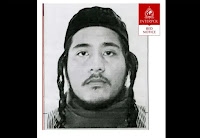A top Palestinian leader told The Post he expects that President-elect Donald Trump will “destroy Iran,” which will cause remaining Hamas influence to crumble.
Hamas has been decimated by Israel’s war in the Gaza Strip, but in the West Bank the terror group has been rising up against the Palestinian Authority, which is run by the rival Fatah party.
The Palestinian Authority is supported by western governments including the US, and Hamas and other Islamist groups accuse it of cozying up to Israel.
Palestinian security forces have been cracking down in particular at refugee camps in the West Bank town of Jenin, where more than a dozen extremist gunmen stole two PA government vehicles earlier this month, parading them around while waving Hamas and ISIS flags.
“We are confronting Hamas’ ideology. Our problem is with Hamas’ link to regimes outside Palestine,” Mohammad Hamdan, Secretary General of the PA’s ruling Fatah party told The Post, referencing Iran in particular.
But Hamdan said he expects Trump’s return to the White House will lead to the jihadists’ defeat.
“We see that Trump and the ruling government in Israel are planning to destroy Iran, so Hamas [followers] will have no other choice than to become Palestinian,” the Fatah leader predicted.
The PA has killed at least three extremist militants in Jenin since the Dec. 6 incident as it pledges to either arrest or eliminate all participants.
The Post spoke with Hamdan and several other top PA leaders in Nablus, about an hour south of Jenin, on Dec. 19.
Hamas took over the Gaza Strip after defeating Fatah in a 2006 election. The terror group’s brutal rule included an Islamist crackdown in the Palestinian territory and repeated incursions into Israel.
It culminated with the Oct. 7, 2023, attack on southern Israel in which terrorists killed 1,200 people and took more than 250 hostage.
Fatah, the US and Israel have a shared goal in fighting Hamas, which includes the destruction of the state of Israel as a founding principle.
“Hamas rejects international legitimacy, meaning UN resolutions,” Hamdan said.
“The world cannot accept a situation where a party does not accept international resolutions.”
In interviews with The Post, Palestinian Authority leaders condemned the growth of Israeli settlements in the West Bank — but acknowledged Israel’s right to exist.
Hamdan also said Palestinian Authority President Mahmoud Abbas “still supports realistic relations with the Americans in order to achieve the aspirations of the Palestinians.”
However, he also expressed strong skepticism of US policy in the Middle East — and blamed the rise of Islamic extremism on American foreign policy.
“Look what happened in Syria. First, the US declared the rebels to be al Qaeda, and then [last week] an American delegation visited Syria,” he said. “And the one before that, when the Americans struck deals with the Taliban in Afghanistan.”
“We as Palestinians believe that most of these extremist Islamic groups are produced by America by its effort to create a new Middle East,” the secretary general claimed.
A senior Israeli official told The Post that the PA’s opposition to Hamas could further provide leverage for peace talks.
“There could be a historically unprecedented opportunity for the PA” to strengthen its grasp on the Palestinian territories, the official said.
The Palestinian Authority has been floated as one option to govern the Gaza Strip once the war ends.
However, the official said, the Palestinian Authority would need to “stop the corruption” and cease “funding terrorism” on Israeli settlers to “participate in day-after talks” about Gaza’s post-Hamas governance.
“I still prefer [the PA] to radical Islamists,” the official noted.


















